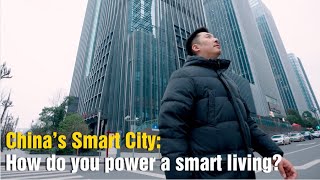The installation of technology related to ‘smart cities’ has sparked debate among activists and politicians in Adelaide – but what exactly is a smart city?
“Smart city” is a term used by Australian and international companies to describe a range of technologies deployed and operated for local governments.
In 2016, Prime Minister Malcolm Turnbull announced a smart city plan that included a $50 million funding package.
From 2017 to 2020, funding is open to Australian parliamentary territories, territories and metropolitan areas.
Sponsored Technology funds a wide range of public transport and infrastructure related projects – from free public Wi-Fi to parking benches with charging stations.
The council hopes the technology will improve operations and keep communities safer.
What does technology do?
Smart city technology can perform a variety of functions, including finding free parking spaces or sensors that notify city officials when trash should be put in public bins.
Some projects aim to improve environmental conditions.
The project co-funded by Cairns Regional Council aims to reduce the city’s impact on the Great Barrier Reef by using sensors in the waterways.
The mayor of the northern suburbs of Adelaide, Gillian Aldridge, said Salisbury’s proposal would include the use of motion sensors to help elderly people cross the street.
Where will smart city technology be installed?
The technology is being rolled out to communities across Australia.
Municipalities in the state capital as well as major regional cities such as Karratha in Western Australia, Townsville in Queensland and Broken Hill in New South Wales have rolled out a number of smart city initiatives.
A total of 81 projects were funded.
Currently, the city is self-funding the technical installation.
Where does the term “smart city” come from?
The concept of a smart city was first proposed by the International Business Machines Corporation [IBM] in the late 1990s.
Shadi Shayan, a smart city expert at the University of South Australia, said the concept of “smart city” was still evolving and there was no single definition or rating system for a smart city.
Various cities around the world have been recognized for their technological innovations, he said.
“Singapore is known for its smart public transport,” Ms. Shayan said.
“Amsterdam in the Netherlands has a strong focus on sustainability and is known for its smart energy, smart waste management and alternative modes of transport.
“Seoul, South Korea is known for its extensive network and sensors are used to collect data to improve the city’s services.”
As overpopulation becomes a worldwide problem, many cities are trying to reduce traffic congestion, he said.
“Spain and Japan are leading the way in using innovative technologies to improve public life by reducing traffic congestion, Barcelona has implemented a strategy to promote sustainability and improve safety. public transport, and Tokyo has also implemented a traffic management strategy,” Shayan said.
Why are there protests against smart cities?
Some delegates opposed the plan and some residents expressed concern about installing surveillance cameras in public places.
Salisbury Councilor Grace Bawden called for more transparency ahead of the installation.
“I think the council is hiding a lot of things from the public,” Ms. Bowden said.
Most communities in Australia, including the city of Salisbury in South Australia, say they do not support facial recognition.
However, some cameras have the ability to turn on even without the technology, but some fear that will happen later.
Flinders University associate professor and chair of the privacy and security engineering committee Alireaza Jolfaei said many people are concerned about how data is being used.
He said there must be clear guidance on increasing video surveillance to build public trust.
A study by the University of South Australia found that 45% of respondents had never heard of the term smart city and 54% did not understand the concept.
More education in technology could be beneficial, according to researcher Shadi Shayan.
“A lot of people who are concerned about privacy don’t know what a smart city is,” Ms. Shayan said.
“We can’t say we want technology everywhere, we use it everywhere but public spaces.
“I think the move to smart cities is inevitable.”
Can technology protect our communities?
South Australian Police Commissioner Grant Stephens has welcomed facial recognition technology as some Australians protested.




